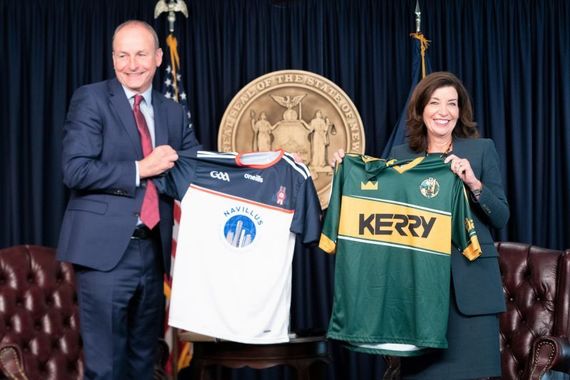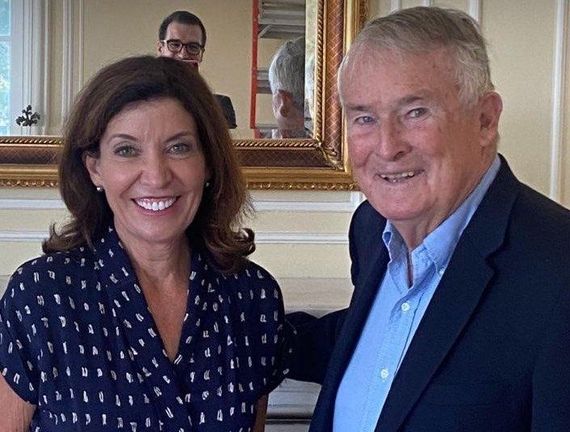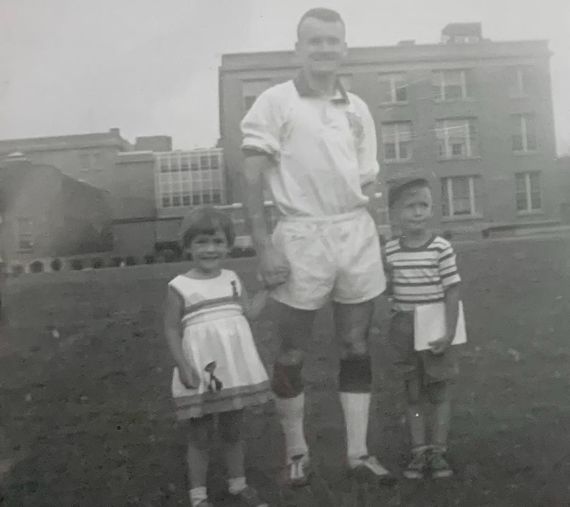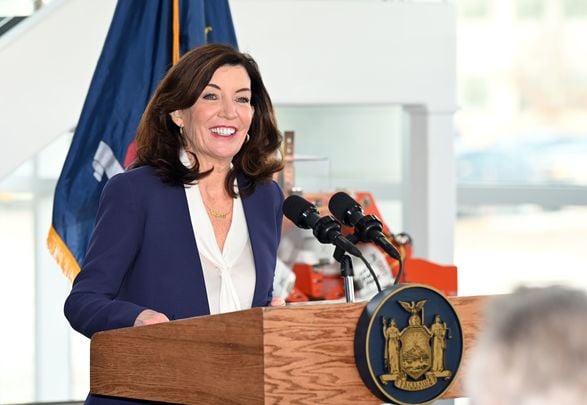Kathy Courtney Hochul is the first female governor of New York State, and she is Irish through and through. The NY Governor talks about her strong Irish background, her commitment since childhood to helping others, and her hopes for New York.
Editor's note: New York Governor Kathy Hochul's father, John P. Courtney (87) passed away suddenly while his daughter was en route to Israel overnight. Hochul was born and raised in Buffalo, New York, and has always been proud of her strong Irish Catholic roots. Courtney can trace his strong Irish links back to County Kerry.
As the Governor continues on with her duties in Israel providing support and solidarity to the people of Israel where war has broken out between the state and Hamas-occupied Gaza.
Below is an interview carried out ahead of St. Patrick's Day, March 2022, where the New York Governor speaks about her strong Irish pride.
When New York Governor Kathy Hochul was in eighth grade her parents, John and Patricia Courtney, took their family on a trip to Washington, D.C. They had a connection who arranged a visit to the Capitol, an old Irish friend from South Buffalo, James Molloy, who served as the last doorkeeper of the House of Representatives.
The Courtneys enjoyed their tour, and young Kathy was hooked on the buzz. She soaked in the atmosphere and decided that one day she was going to work in politics. She wasn’t aiming for elected office at the time, though.
“I wanted to be a staffer for a senator and go to law school. I was always going to stay behind the scenes,” Hochul told the Irish Voice during an interview on Thursday, March 3 at her Midtown Manhattan office.
She did indeed realize her dream of law school – she’s a graduate of Catholic University of America Columbus School of Law – and she worked as a legislative aide for several years. But these days, Kathy Hochul is anything but behind the scenes as she owns one of the most high-profile, intense political jobs in the country.
She’s the first female governor of New York, taking over mid-pandemic from Andrew Cuomo who resigned last August. After Hochul took the reins, calm quickly replaced the tumult that marked the former governor’s last months in office as sexual harassment scandals began to pile up.

Irish leader Micheal Martin and NY Gov Kathy Hochul exchange jerseys in New York.
Hochul, 63, is confident that on November 8 of this year she’ll add another “first” to her resume – the first female elected governor of New York. If she wins a four-year term you can be sure that in her acceptance speech her “big Irish Catholic family” will be the first people she thanks, just as she did when she was sworn-in last summer.
Is it accurate to say that Hochul, the granddaughter of immigrants from Co Kerry, is the most Irish governor the Empire State has ever had?
“You can say that if you like,” she replied with a broad smile.
There was Hugh Carey of course, one of the “Four Horsemen” whose imprimatur on Irish issues was a must back in the seventies and eighties, a club whose other members were House Speaker Tip O’Neill and U.S. Senators Edward Kennedy and Daniel Patrick Moynihan, an old boss of Hochul’s. George Pataki, who served three terms as governor from 1995-2007, had an Irish grandmother from Co Louth.
But Hochul’s Irish-American backstory is stitched into her everyday life and constantly informs how she lives and how she governs. Kathleen Mary Courtney Hochul and her family started out with little but achieved a lot, not rags to riches style but in a way that allowed them to prosper through hard work, education, a commitment to helping those less fortunate, and a steadfast devotion to all things Irish.
Hochul's paternal grandfather John Courtney was a native of Cutteen, Maharees on the Dingle Peninsula in Co. Kerry, a stunningly beautiful place but rife with poverty. Grandmother Mary Browne was also a native of Kerry and equally destitute.
“I think in my grandmother’s situation, they were so poor that they were never going to be able to get together a dowry or anything like that,” Hochul says. “And my grandfather was the oldest of a large family. He was going to make money and send it back home. He became a migrant worker in South Dakota.”

Governor Hochul with her father Jack Courtney.
Mary, meanwhile, left home when she was 17 and made it to Chicago. John also relocated there for better job prospects. They didn’t know each other in Kerry, but that changed in the Windy City. “I think they met in an Irish club,” Hochul recalls.
John and Mary were domestic workers when they married in 1935. They had jobs in the same home for a wealthy but cruel boss.
“And then one night they escaped. Grandma said, ‘I’ve had enough of this.’ And they escaped out a basement window. They heard there were jobs in this wonderful place called Lackawanna, a New York steel town,” Hochul says.
So the newlyweds headed east to South Buffalo. John Courtney found work in Bethlehem Steel and the couple started their family. John P. Courtney, the governor’s father, was the first born, in 1936. He spent year one of his life back in Co. Kerry with his mother.
“They didn’t have any money when he was born. Grandma had to take him home to get some childcare. It was complicated. Grandpa stayed here and kept working in the steel mill. I have pictures of him there. It was very dangerous, backbreaking work,” Hochul says.
When Mary and baby John returned to Lackawanna, seven more Courtney kids came along in the years that followed. They squeezed into a two-bedroom house with six boys sleeping in a heatless attic in rows of beds that resembled a dormitory. The rest of the family, which also included two Irish aunts, shared the two bedrooms.
“I would go and stay overnight and sleep in the bed with one of my aunts. There were pictures of Ireland on the walls,” Hochul recalls.
The working-class Courtneys raised their eight kids as if they were living back in Kerry. Mary and John were thoroughly involved in Irish causes and were among the founders of the first Buffalo Irish Center, a thriving place of all things Irish that exists to this day. John was a member of the American Irish Immigration Committee’s Buffalo chapter which participated in a 1968 congressional hearing about the adverse effects the 1965 Immigration and Nationality Act had on Ireland. He wrote a column about happenings in Buffalo for one of the New York Irish newspapers, and regularly hosted visitors from Ireland who were seeking support for the civil rights movement in the North.
“People would come from Ireland and stay at my grandparents’ house. They were very involved in the fight for freedom,” Hochul recalls. “Everybody was so involved in supporting Ireland during the late sixties and seventies.
“Grandma and Grandpa were always feeding people who were coming from Ireland to help support the cause. There was always something going on in their house. We were always meeting Irish people there. They would talk about how we could help the freedom fighters.”
Given Co Kerry’s traditional history as a Gaelic football powerhouse back home, it’s not surprising that John was the founder and president of the North American Gaelic Athletic Association and that he was a star player for the local Buffalo team.
So was his son John P., better known as Jack. The governor’s father and granddad at one point played on the same side, and there’s still a picture of John and Jack in their gear on the wall of the Buffalo Irish Center. Jack was so good that he was invited to play on the New York all-star team that was due to travel to Ireland for a big match in August of 1958 but he had to bow out, for good reason. The game coincided with the week his second child and first daughter, Kathleen Mary Courtney, the future governor of New York, was due to be born.
“Yes, he was definitely a little bit conflicted there,” Hochul laughs.

Jack Courtney, in his Gaelic football togs, with daughter Kathy and son Denn
Jack followed in his father’s footsteps and was employed by Bethlehem Steel, and for a while after his marriage to Patricia “Pat” Rochford the couple lived in a trailer park near the plant. They had six children in all, and after Kathy made her debut, the young family moved to a two-bedroom flat.
Jack Courtney worked at Bethlehem and simultaneously studied for a degree at Canisius College in Buffalo which he earned in 1958. He applied for a clerical job at the plant and got it, but when he was 30 years of age and father to five of his six children, two acquaintances who worked at IBM started a small tech business and wanted Jack to join them.
He made the move despite being warned against it. He had a solid job at Bethlehem and many mouths to feed, and his colleagues wondered why he would risk what was supposed to be secure employment for a lifetime.
“I talked to many people later who said they thought he was crazy because he left a stable job. Bethlehem would be there forever, they thought, and he had all these little kids,” Hochul says.
But her father made the right call. Bethlehem shut in 1983 and the locals were out of work. Jack Courtney eventually became president and COO of the tech company he joined, Computer Task Group, which grew into a Buffalo-based giant with close to 4,000 employees.
Kathy Courtney was a studious child with a social conscience fostered by her parents and, of course, Grandpa John (who passed in 1995 at the age of 86), and Grandma Mary (90 when she died in 2000).
“My parents were very political. They were in their twenties and young activists with a family. They were Kennedy Democrats, and we grew up in a Catholic household devoted to social justice. My parents protested the Vietnam War. We had uncles serving over there but they wanted them home because they thought the cause was not right,” Hochul remembers.
The six Courtney kids became activists in training too. The governor remembers being around 10 years old and going to marches to rally against hunger, and doing a 20-mile walk when she was 13 to raise awareness and funds to feed the poor.
Pat Courtney, who had a dash of Irish heritage – “she was a little German, Irish, English,” Hochul says – was a dynamo when it came to organizing. With a nun, she helped start the Neighborhood Information Center where people from the parts of Buffalo with the highest poverty rates could get services. Kathy and her siblings pitched in at the center too.
When the future governor was 12 years of age, her mom had another task for her – being a kindergarten teacher at a summer camp Pat founded for the kids of Puerto Rican migrant workers who would flock to Buffalo for the season.
“She started a camp for the children. They needed a healthy environment. I was in sixth grade and I remember her being very pregnant with the last of my brothers,” Hochul says.
“She found volunteers to teach music, arts and crafts, and she made me the kindergarten teacher because I was a good babysitter. She was determined to create a nurturing environment for the kids, so that’s how we spent our summers.
“My parents were very engaged in all the causes you can imagine. A sense of responsibility was instilled in us. It was reinforced in the Catholic Church teachings of Christ and how we have to look out for the least of my brothers. We lived that and talked about it all the time.”
While a student at Hamburg High School, which she graduated from in 1976, Hochul joined a government studies program that allowed her to leave early to pursue an internship…no study hall or lunch periods for her. Instead, she took a bus every day at noon, through the back streets of Buffalo, to get to the city’s Democratic Party headquarters.
She was a young volunteer there, doing chores and learning the political ropes. In return, she got 50 cents daily to pay for the bus ride home. Those she worked with included the late NBC News/Meet the Press great Tim Russert, a proud son of Buffalo who passed too soon in 2008 at the age of 58.
“I learned so much. Joe Crangle from Buffalo was the state chair of the Democratic Party then so a lot of national politicians came through our little office. I was the only girl and definitely the youngest by far. Tim Russert was just out of college and he worked with me on the (Daniel Patrick) Moynihan Senate race in 1976,” she remembers.
Hochul went on to earn a BA in political science from Syracuse University in 1980, and during her college years, she did a semester abroad in London. A short hop away from the land of her beloved grandparents, Hochul took full advantage of the proximity and headed to Ireland on many weekends, not only to Kerry but to Dublin and Meath where she also had cousins who were dairy farmers.
“My grandmother would say, ‘Stick your thumb up and someone who is probably related to you will pick you up!’ So I would go over to Ireland all the time to see my family,” Hochul says.
Scrolling ahead some decades, Hochul and her husband William brought their two children, Will and Katie, to Ireland one summer when they were youngsters so they could get acquainted with the roots that are embedded in their mother’s DNA. Hochul’s parents had rented an old house owned by a relative in Kerry for six weeks, and each of their six children were offered a week to come with their families to experience at least a tiny slice of the life Grandma and Grandpa Courtney had to leave.
“The house had a thatched roof and a pot-bellied stove. The homes were very primitive. It looked like they hadn’t changed in a hundred years,” Hochul recalled.
Other visits to Kerry – Hochul has made so many – have included up-close lessons on the evils Irish Catholics had to endure during the terror Oliver Cromwell inflicted on Ireland in 1649. The Courtneys are related via marriage to the Goodwin family which has lived on the Seven Hogs islands, located off the Dingle Peninsula, for generations. Hochul remembers one eye-opening trip.
“We went on little boats out there. And the islands had these underground catacombs when Oliver Cromwell was killing Catholics. The people went to church services underground to hide so you weren’t persecuted for practicing your religion,” the governor says.
“Just experiencing the whole culture of the challenges the Irish had to endure, the persecutions, the discrimination for centuries…that was part of the story told to me when I went there and saw how people lived and how they had no opportunities for jobs.”
After a career that started as a lawyer and soon transitioned to politics, including a period as a member of the House of Representatives, Hochul is gearing up for a months-long campaign to win her first four-year term as governor. State Attorney General Letitia James, once considered a formidable primary challenger, dropped out of the race not long after she entered it.
The governor sewed up significant Democratic support soon after taking office and also proved herself to be a powerhouse fundraiser, with a record-setting haul of more than $21 million in the bank from when she took office to the end of January 2022. Long Island Congressman Tom Suozzi and New York City Public Advocate Jumaane Williams remain in the primary, but polling indicates that their quests will be uphill all the way.
How does Hochul see the next few months – and a four-year term if she’s elected – unfolding?
“We have a lot of recovery that we still need. We have to continue to restore people’s faith in government which has been really shattered here in our state and our nation. There’s this sense of divisiveness I want to try and heal,” she says.
“I’ve represented very diverse parts of New York – Republican areas, Trump areas, and we have the left-leaning side. I want to bring it all together and go back to the core FDR values and the JFK values of uniting and working on issues that affect people – jobs and opportunities, education, health care. We have plans behind all of those things. They are not just platitudes.
“My budget reflects all of these priorities as well as building incredible infrastructure. Like we built the Erie Canal. This is how you change people’s lives.”
Showing that a woman can successfully govern a big, diverse state like New York, with a combination of strength and respect, is also of utmost importance to Hochul. Though she doesn’t mention Andrew Cuomo by name – the two were not close during her six and a half years as lieutenant governor – it’s clear who she’s referring to when she says a toxic culture in Albany won’t take root under her watch.
“We are focused on just pulling it all together, reducing the drama associated with this job. Women can get things done. We are very results-oriented. It’s not about getting credit; it’s about getting results,” she feels.
“I want to put a different imprint on government and show you don’t have be a bully and be the toughest guy in the room. The rough and tumble politics of New York are something a tough woman – a tough Irish woman – can actually handle without any problem.
“A lot of women are watching to see how we do this. To see how a woman can govern a place that people thought only a man could handle. I have to prove those people wrong.”
The St. Patrick’s season is always a joyous one for Hochul. She’ll be marching on Fifth Avenue in this year’s parade which returns to its rightful home in the heart of the city on the 17th after a two-year pandemic forced detour.
“Oh, of course!” she says. “I’m really looking forward to that. I was sorry to miss it when it was canceled.”
A stop at the Buffalo Irish Center is also on the governor’s agenda. It’s obviously a place she knows inside out.
“Anyone who wants to run for statewide office in New York has to come to the center. And you’ll be there with hundreds of people carrying on the tradition. It’s a special place. I remember watching my father playing Gaelic football there so many times,” she says.
Last September, one month after becoming governor, Hochul had a welcome visitor, Irish Taoiseach Micheál Martin. The two exchanged Gaelic jerseys – Hochul gifted Martin a New York GAA one, while she received the gold and green of Kerry.
There are loads of Courtney cousins scattered throughout Ireland, and they’re mighty proud of their famous Yank relative with the top job in the Big Apple.
“All of my relations keep sending over clips of stories in the Irish papers,” she says. “It’s a huge gift to have this position, and if it puts a little spotlight on the Emerald Isle that’s a good thing as well.”
So when is the governor planning her next journey to Ireland? Jack Courtney, a robust 85, is heading over in May. (Mom Pat passed from ALS in 2014).
“Oh yes, I will have a lovely trip at some point. My dad is going and I was going to go with him if I was lieutenant governor.
“But,” Hochul laughs, “my circumstances changed.”
*This column first appeared in the March 16 2022 edition of the weekly Irish Voice newspaper, sister publication to IrishCentral, updated in Oct 2023.




Comments